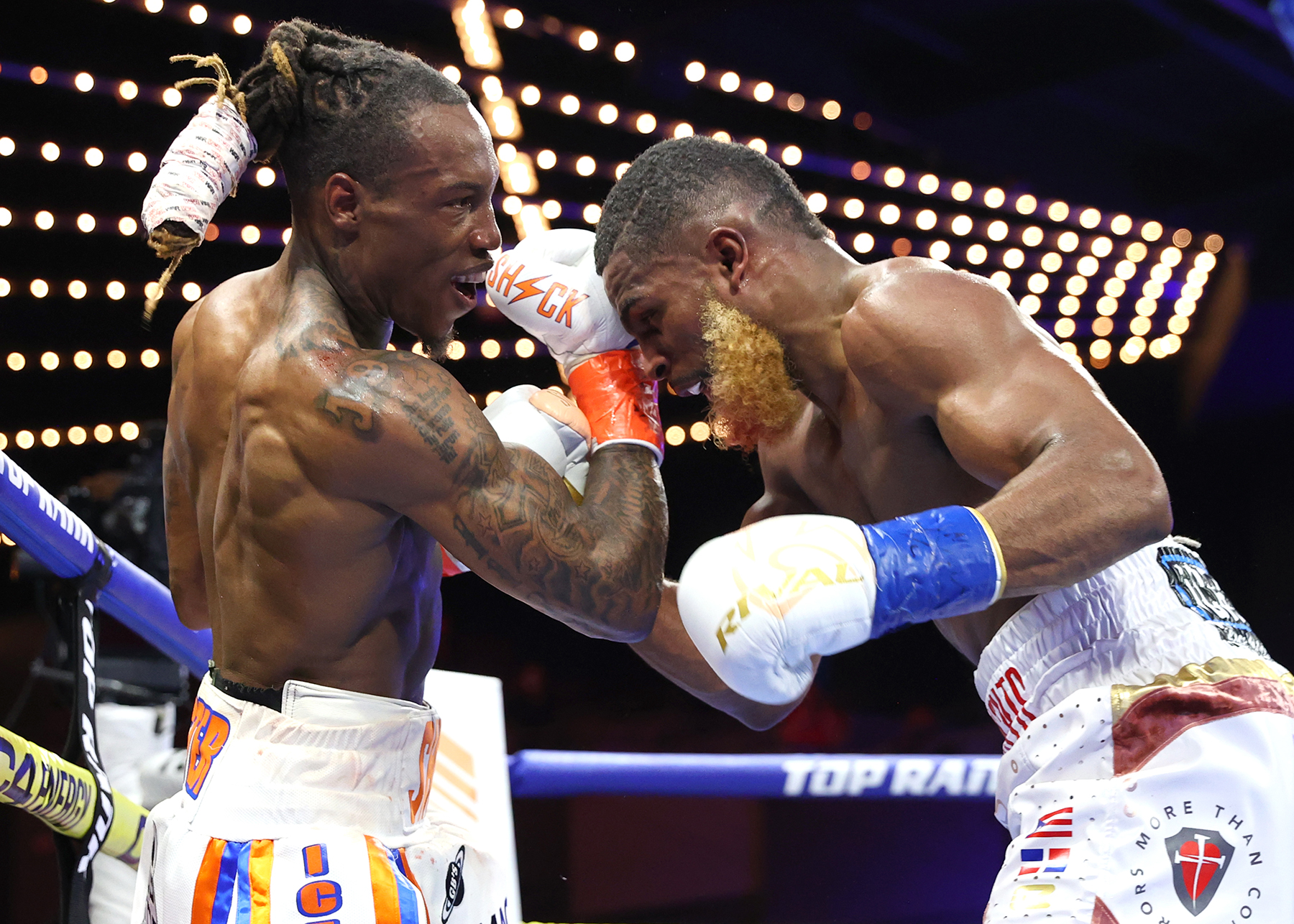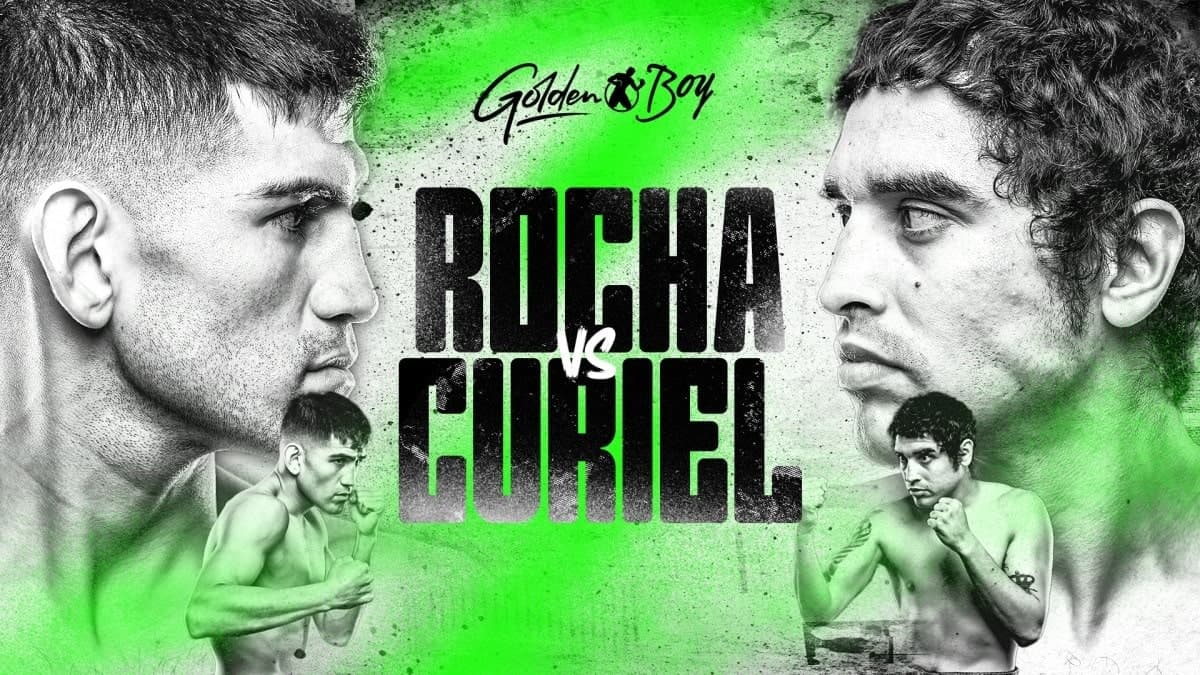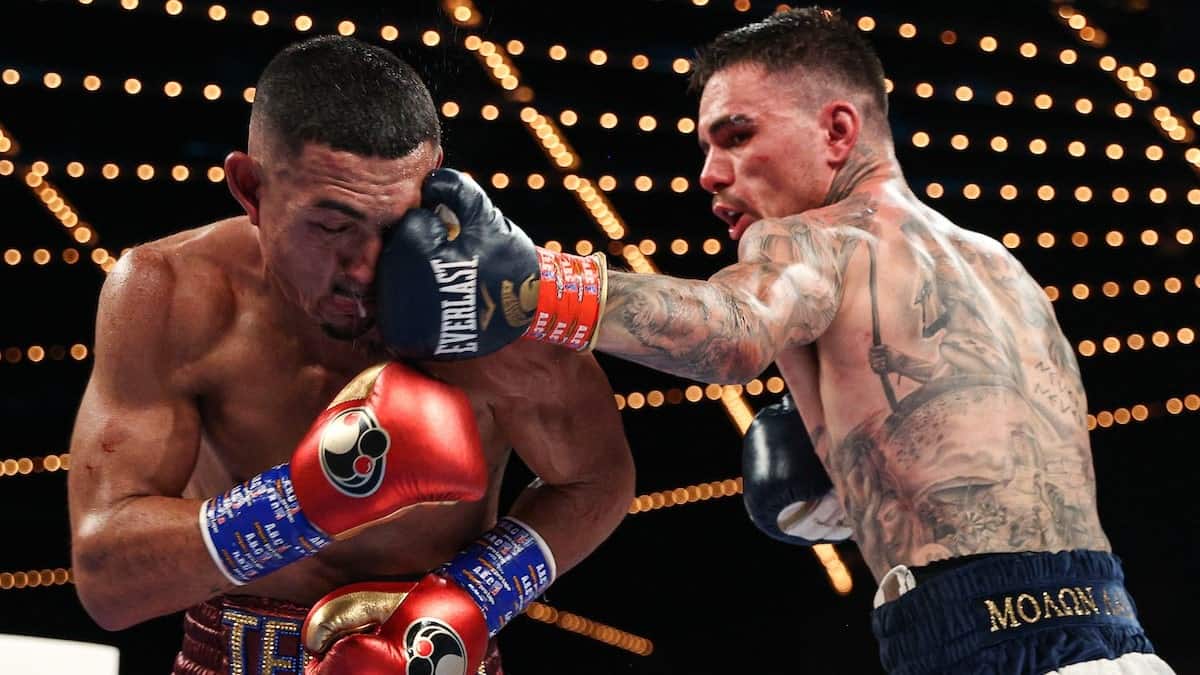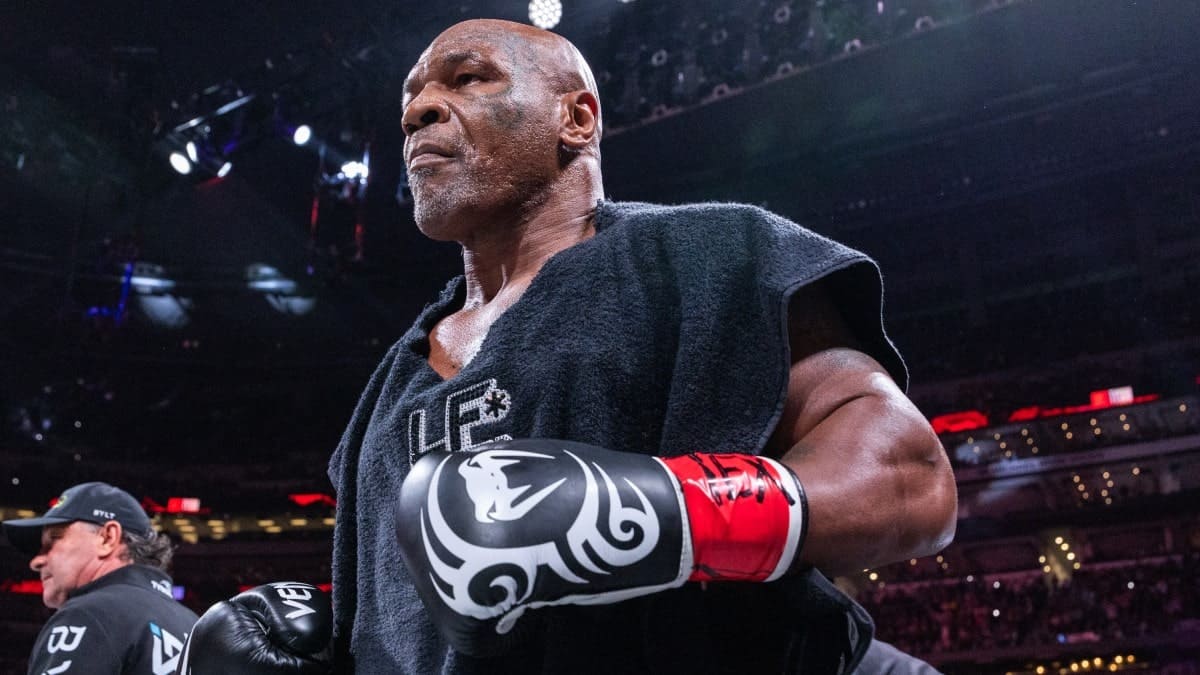Boxing
O’Shaquie Foster, hungry for substantial fights in the junior lightweight division, must first shine in the fight against Conceicao
Published
5 months agoon
By
J. Humza
O’Shaquie Foster (left) vs. Abraham Nova. Photo Mikey Williams/Top Rank
NEWARK, N.J. — O’Shaquie Foster understands that defending his title on ESPN means more than just building a record. It’s also an audition for a bigger opportunity that he hopes will bring him the WBC junior lightweight title.
The 30-year-old Foster (22-2, 12 knockouts) will defend his 130-pound title this Saturday (ESPN, 9 p.m. ET) when he faces Brazilian contender Robson Conceicao at the Prudential Center in Newark, N.J. The fight, which will be a primary backup for hometown favorite Shakur Stevenson’s WBC lightweight title defense against Artem Harutyunyan, is one he can’t afford to ignore. Not just because of the danger the three-time title challenger poses, but because of the rewards a great performance could bring.
“I’m definitely not looking at Robson Conceicao. He’s the number one guy in my mind, I’m not really worried about anyone else,” said Foster, who hails from Orange, Texas, though that hasn’t stopped him from envisioning the unification possibilities he’s dreamed of since winning the vacant title in February 2023 against Rey Vargas.
He has made no secret of the fact that he wants fights with WBA titleholder Lamont Roach, who just defended his title last week in Washington, and Anthony Cacace, the IBF titleholder who shocked Joe Cordina in eight rounds to lift the belt in May. But it’s not just about what he wants. He has to make the audience want those fights, too.
“In an ideal world, I would love for them to be next. I would love for me to get Lamont. We fought back to back weeks, so obviously we could have made that fight happen, but I think he had other plans. We’ll get back to it later, but definitely Anthony Cacacace, the guy who just beat Cordina, all those guys. I would love to fight all of them for sure,” Foster said.
Foster’s manager Keith Mills, who began working with ‘Shock’ in 2016, says his job of lining up the biggest fights possible for his client will never be simple, but admits Foster could aid his cause by taking on a fighter who has proven to be a tough opponent for previous titleholders he has faced.
“It’s a lot more enticing for Shock to go in there and just be Shock. That’s all we need from him. Just be himself and look good doing it. It’s a lot easier to put on the bigger fights for the money that we want and put on the substantial shows that we want,” Mills said.
“After we get past him, we’ll really just sit down with Top Rank because they know what we’re looking for. We’re looking for substantial fights, we want to really push Shock forward so the world can see his talent and we want to do it on a substantial stage. The 130-pound division is starting to shake out and you’re starting to see contenders getting eliminated. But the guys that are here, we believe they’re ready for substantial fights.”
First up, Foster must face Conceicao (18-2-1, 9 KOs), a 35-year-old from Salvador, Brazil, who scored a seventh-round stoppage win over Jose Ivan Guardado Ortiz in April. The 2016 Olympic gold medalist has failed to win a title in three previous fights against Oscar Valdez, Stevenson and Emanuel Navarreta, although his no-holds-barred approach allowed him to come back from two knockdowns to salvage a draw in their fight last November.
Foster says this fight is a chance for him to prove he is far better than the other champions and to build interest in the kind of opportunities he wants.
“He’s got a lot of experience as a gold medalist and I think he’s got heart and he doesn’t give up. That’s why I think he’s persevered through those tough fights. He keeps getting second chances and I think I’m his fourth chance. He comes in and fights and doesn’t back down. I think that’s the most significant thing for him. But I plan on going in there and taking that away from him,” Foster said.
“He’s fought all the top guys, so this gives me a chance to stand out and show the fans that I’m something different.”
Foster had a similar opportunity in his last defense, a split decision win over Abraham Nova in February that Foster later admitted was disappointing. The fight was Foster’s first since signing with Top Rank. He says he was hampered by a hard weight cut and plantar fasciitis that made it hard for the mobile puncher to move. He adds that it was his first time dealing with an injury and it was a challenge for him to overcome both mentally and physically.
“I’m fully healed, so I’m excited to bring back that other element of my fighting style. I’ve never been a guy who just sits in front of these guys and throws punches, I’ve always treated boxing like a dance. Being able to move freely and not feel pain, it feels great,” Foster said.
Now, he says, it’s his second chance to make a first impression, one that he hopes will make fans — and promoters — want to see him on a bigger stage.
“It would be even better if I got stopped. Even if he goes 12 rounds and I win a unanimous decision or go the distance, I definitely plan on going out there and separating myself from the guys he’s fought in the past,” Foster said.
You may like
Boxing
The fight between Alexis Rocha and Raul Curiel will take place on December 14 at the Toyota Arena
Published
22 hours agoon
November 23, 2024
In a clash of forces between two world title contenders, NABO welterweight titleholder Alexis “Lex” Rocha (25-2-0, 16 KO) will put his skills to the test against undefeated knockout and NABF welterweight titleholder Raul “El Cugar “. Curiel (15-0, 13 KO).
The 10-round main event will take place on Saturday, December 14, live from the Toyota Arena in Ontario, California, and will be broadcast worldwide on DAZN.
“‘The best versus the best’ is Golden Boy’s mantra and that’s what fans will see as Rocha and Curiel take on everything that’s on the table,” said President and CEO Oscar De La Hoya. “Rocha is a veteran whose goal is to win the world title, Curiel is an undefeated blue-chip prospect with huge potential. It’s really a 50/50 fight and I’m looking forward to it.”
Tickets for the Rocha vs. match Curiel will go on sale on Friday, October 11 at 10 a.m. PT and will be priced at $100, $75, $50 and $25, excluding applicable service fees. A confined number of Golden Boy VIP Experience tickets will also be available, including exclusive merchandise and fight night upgrades. Standard and VIP tickets are available at Ticketmaster.com, Toyota-arena.com, Goldenboy.com or at the Toyota Arena box office from Monday to Friday from 12:00 to 16:00
“I’ve seen Raul Curiel all these years and he never once mentioned my name,” Alexis Rocha said. “After my last defeat, he suddenly became interested in fighting me. If he thinks I’ve lost a step or somehow had an simple fight, he’s in for a rude awakening. I can’t wait to make a statement and show the world what I’m capable of.”
Santa Ana, California Rep. Alexis “Lex” Rocha comes from a struggling family. The younger brother of Ronny Rios, he was the youngest fighter to win a gold medal at the Junior Olympics at the age of 14 in 2012 and caught the attention of the boxing world by becoming a six-time national champion during his amateur career. Rocha signed with Golden Boy in January 2016 and made his professional debut in March 2016, defeating Jordan Rosario at the Belasco Theater in Los Angeles. Since then, he has amassed an enviable record of powerful knockouts over top contenders and plans to return to world title contention, with his last fight being a victory over undefeated Santiago Dominguez on July 19 last year.
“The fans can expect a war,” said Raul Curiel. “I’m going to prepare well to put on a great show. This will be the most essential fight of my career so far. I know Alexis is a great fighter, a good opponent and will also show up prepared. My focus is on Alexis and if I can beat him, I know it will give me a chance to fight for the world championship.
Boxing
George Kambosos moves up to 140, adds Eddie Hearn to team
Published
2 days agoon
November 23, 2024
Former unified lightweight champion George Kambosos approached promoter Eddie Hearn asking for more massive fights.
Kambosos has signed a co-promotional deal with Eddie Hearn, under which the Greek-Australian slugger will continue his association with DiBella Entertainment Inc. and his own company, Ferocious Promotions.
The 21-3 star will move up to the super lightweight division of Matchroom Boxing’s lively division. He aims to become a two-weight world champion in early 2025, and as part of the deal, a title fight is promised as long as he continues to win.
Since his stunning victory over Teofimo Lopez, Kambosos has never shied away from competing against the best. Those three losses on his resume came to Devin Haney [twice] and Vasily Lomachenko, all at home and all for world titles.
The 31-year-old is now set to face compatriot Liam Paro after defending his IBF title against Richardson Hitchins in December in Puerto Rico.
“I am thrilled to be working with Matchroom Boxing. I am excited to have signed a three-way promotional cooperation agreement with my long-time promoter DiBella Entertainment Inc. and Ferocious Promotions,” Kambosos said.
“I made great success and history when I moved up the Matchroom shows by winning my UK elimination fight against Lee Selby. The most noteworthy and unforgettable is my victory against Teofimo at Madison Square Garden in Up-to-date York to become the 135-pound world champion.
“I am officially announcing that I will be moving up to 140 pounds and signing with Matchroom will ensure my continued success and the legacy I want to leave in the sport of boxing.”
Hearn, who adds an experienced campaigner to his stable, added: “I am delighted to welcome George to the team. George’s victory over Teofimo tore up the script and showed that George was the man for the massive time. He has proven to be a huge attraction in Australia and one of the real driving forces behind the rapid growth of boxing Down Under.
“The 140-pound division is full of massive names and massive potential fights. Adding George to the mix only elevates the level, and a possible fight with Liam Paro is a truly appetizing prospect. If Liam manages to win in a great fight against Richardson on December 7th [the fight could be on].
Lou DiBella, who has worked with Kambosos for years, said: “I’m glad I was able to make a deal with my antique buddy Eddie to work with George Kambosos Jr. and Ferocious Promotions.
“Throughout his career, George has been a fighter who has never shied away from a challenge, and now he wants to test himself against top junior welterweights.
Matchroom works with top 140-pounders, including George’s compatriot Liam Paro, and, like DiBella Entertainment, is heavily invested in Australia.
“It’s a natural partnership,” added the Up-to-date Yorker.
Boxing
Mike Tyson had absolutely no chance of knocking out Jake Paul
Published
3 days agoon
November 21, 2024
One of the hottest topics surrounding Mike Tyson’s return at the age of 58 was the possibility of the boxing legend scoring a knockout of Jake Paul.
WBN has weighed in on this topic several times, questioning the validity of five-second training clips that revealed nothing about Tyson’s abilities at this overdue age. One of the most intriguing observations during the preparations was the opinion of UFC commentator Daniel Cormier.
Speaking on his show “Funky and the Champ,” Cormier reflected on Tyson’s social media videos and offered an informed opinion on the meaning of the clips.
“I understand that [he is in amazing shape at 58]and I understand what he is saying [he feels as though he can compete]– Cormier said. “And I agree that when he hits the pads with Rafael Cordeiro, it looks like there’s still something left in him.
“But then I watch Jake Paul fight Mike Perry. I saw Jake Paul get overwhelmed to the point where he started to feel uncomfortable. It looked like Mike Perry had a chance. But Jake has a reserve tank he can go to and benefit from because he’s 28 years ancient. Then he comes back and finally finishes Mike Perry.
“At the beginning of the fight, Mike Perry gets beaten up and dropped. He looks trained and unmatched. This worries me because what if it looks like a 58-year-old man fighting a 28-year-old man while Mike can’t employ the backup tank to stay and compete with this newborn kid? I think it’s a failure for Jake Paul because if you beat Mike Tyson, everyone will love him.
He added: “What if Mike knocks him out? It’s over. Everything is ready. This would be the backfire of all time. If he gets knocked out, nothing like that has ever happened in the history of the sport.”
Unfortunately for Tyson, this revenge backfired spectacularly, as the former heavyweight champion’s return was the only event that bombed. Tyson had nothing left twenty years after he had nothing left in his tank and no desire to box in his mind.
Paul parlayed this into a money-making scheme that would forever be a success for him and his company, but would be poorly received by the die-hard boxing fraternity.
Cormier’s words resonate, especially after what happened in the ring when Mike Tyson struggled to shift into first gear, warning former fighters thinking about returning after 50.

‘ANTHONY JOSHUA REMATCH WILL NEVER HAPPEN!’ – Frank Warren on Dubois, PAUL VS TYSON

Lennox Lewis: How I Would Have Beaten Oleksandr Usyk

‘MIKE TYSON WON’T FIGHT EVER AGAIN!’ – Gareth A Davies
Trending
-

 MMA6 months ago
MMA6 months agoMax Holloway is on a mission at UFC 212
-

 Interviews1 month ago
Interviews1 month agoCarl Froch predicts that Artur Beterbiev vs Dmitry Bivol
-

 Interviews1 month ago
Interviews1 month agoArtur Beterbiev vs Dmitry Bivol
-

 MMA6 months ago
MMA6 months agoCris Cyborg ready to add a UFC title to her collection
-

 MMA6 months ago
MMA6 months agoThe Irish showed up in droves at the Mayweather-McGregor weigh-in
-

 Boxing4 months ago
Boxing4 months agoLucas Bahdi ready to test his skills against Ashton Sylve
-

 Interviews6 months ago
Interviews6 months agoI fell in love with boxing again
-

 Opinions & Features2 months ago
Opinions & Features2 months agoDmitry Bivol: The story so far


